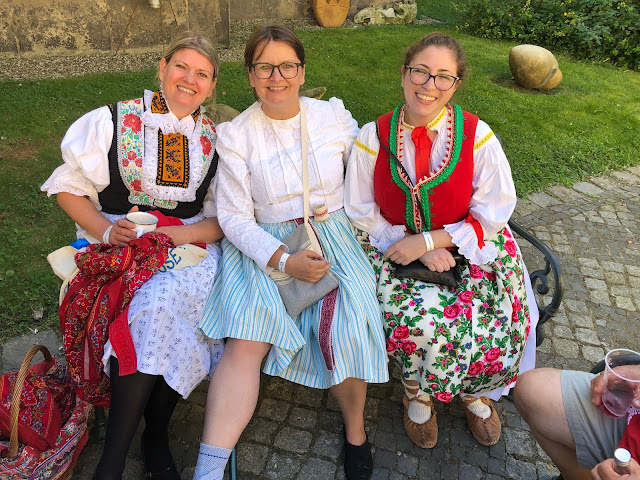Three English Teaching Assistants Jordana Bickel, Dakota Tackett, and Charlie Deichmann experienced a rich portion of Czech culture at the Slovácko Wine Festival in Uherské Hradiště last weekend. Jordana, or Jo, teaches English at an Art High School in Uherské Hradiště and, together with her mentor Martina Dočekalová, an English teacher at the same school, they invited other nearby ETAs to join them for this popular wine celebration. Dakota Tackett, who teaches at an Agriculture High School in Přerov, and Charlie Deichmann, who teaches at an Art High School in Ostrava, both eagerly accepted the invitation. Every year, people from all around the world come to this festival to taste Moravian wine and to watch different regions of the Czech Republic showcase their unique cultural dances, songs, and traditional costumes. Aware of the fact that three American Fulbrighters would join the festival, the Art School Headmaster, Ivo Savara, arranged traditional Moravian folk costumes called “kroj” for the three of them, as well as spots in the parade representing a town called Bojkovice. The pictures below illustrate the atmosphere better than words. As Dakota shared after the weekend: “This event was the highlight of the grant so far.”
Photo 2: Getting ready for the parade. (A female folk dancer helps Dakota tie a ribbon, which is an essential part of the folk costume.)
“It was a great honor for me to be given the privilege of taking part in the centuries-old tradition of wearing a Czech kroj. Marching in the parade with others from the region of Bojkovice as they performed their traditional songs and dances led me to feel more immersed in Czech culture than I have had with any other culture other than my own. What’s more, it was almost equally as rewarding to share photos and videos showcasing this event with my family and friends back home.” - Dakota
“When I was first presented with the opportunity to join the parade and wear a traditional folk costume, I jumped at the opportunity. The Czech Republic has such an incredibly rich cultural history, and learning about how traditional dresses may show marriage status, occupation, and even wealth, I felt the pride people have in their local traditions. It was an honor to have them share not only their traditions, but also their knowledge, with us.” - Jordana
“Another rewarding aspect of the festival was learning about the importance of wine to the Moravian region of the Czech Republic. Throughout the festival, Jo, Charlie and I were given the opportunity to try many different variations of Moravian wines. We also all had Burčák for the first time!” - Dakota
“Petticoats and skirts for females can be easily adjusted to any body shape, because they are wrapped around the waist. To get the traditional garment for the males was a bit more difficult, but luckily Headmaster Ivo Savara and another male dancer from Bojkovice have similar body types to Charlie and Dakota, so they kindly offered their own folk costumes.” - Martina
"Part of what was so wonderful about the festival was that while it was centered around wine, in a deeper sense it was actually about local traditions and culture. Traditional food, such as halusky was available at stalls, folk choirs and dance groups from around the region performed on stages scattered across the city, and a craft market was set up that offered local ceramics and embroidered clothing. The people of UH, who opened their arms to us with such hospitality and genuine generosity, really made the weekend exceptional, and an experience to remember for decades to come.” - Jordana
“The privilege of not only seeing this festival but actively taking part in it is still mind-boggling to me. Many Czechs have likely not even touched the traditional “kroj” outfits, and here we are - three Americans who are being welcomed into the tradition with open arms. The generosity of the folks we’ve met is incredibly humbling on a daily basis.” - Charlie





